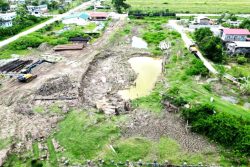The PNCR is in the midst of a power struggle. Despite the fact that Mr Joe Harmon lost in his attempt to succeed to the leadership of the party, he is still the Leader of the Opposition, a body which encompasses APNU+AFC and Mr Lenox Shuman, who currently occupies the joinder seat in Parliament that is shared with two other parties. Under section 184 of the Constitution, the position of Leader of the Opposition is chosen by a majority of non-government members under the chairmanship of the Speaker, who does not have the right to vote. Currently the combined opposition holds 32 seats in the National Assembly, so a majority would be 17 seats.
A major problem for Mr Norton is the fact that so far Mr Harmon has indicated no willingness to surrender his position as Leader of the Opposition. The two did meet on Monday, but that encounter produced no breakthrough. We reported one source as saying that Mr Harmon might consider resigning in a trade-off where Mr Norton would not become Opposition Leader. Our report also recounted how Mr Harmon has held firmly to the view that the PNCR membership did not control the post of Opposition Leader and that he was put there by the voters in the 2020 election who placed their faith in the coalition to lead for the subsequent five years.
That is codswallop of course. It isn’t the APNU+AFC electorate which chooses the Opposition Leader, it is their representatives in Parlia-ment, and if those representatives vote by a simple majority to remove Mr Harmon, then removed he will be. As for the report from a source that Mr Harmon might consider resigning if Mr Norton did not become Leader of the Opposition, that is revealing. It would not effectively change the situation for the PNCR Leader, and would still leave power over the party in other hands. And those hands belong to Mr David Granger.
Mr Granger might sit quietly in Pearl appearing to mind his own business, but he holds a dominant position, namely, as Representative of the List for the opposition. This means that he chooses the members who sit in Parliament, and he can ensure if he is so inclined that neither Mr Norton nor anyone strongly supportive of him has a seat in the National Assembly, or that if they do, his own people will balance them out. In other words he still wants to be in control. The Deputy Representative is the AFC’s Mr Khemraj Ramjattan who presumably chose the nine members of his party negotiated in an agreement with APNU.
The problem for Mr Norton is that Mr Granger did not select him to sit in the National Assembly in August 2020, and by implication has not warmed to him since then. Under the Constitution he cannot be voted Opposition Leader if he does not sit in Parliament, so even if, as was suggested to this newspaper by some sources, there were to be a vote of no confidence against Mr Harmon, he could not succeed to the position without first becoming an MP. It might be noted in passing that it takes one third of the opposition to secure the holding of a no-confidence vote, and a majority, i.e. 17, for them to succeed in removing the incumbent.
The PNCR sits in Parliament firstly, as part of its own coalition, APNU, and secondly in association with the AFC. The choice of Opposition Leader requires the agreement of all those groups in addition to Mr Shuman. APNU can effectively be disregarded because to all intents and purposes the PNCR is APNU. The other so-called parties are little more than paper entities. The AFC, however, is a different matter, although if Mr Norton’s group could bring nearly all the APNU MPs on board, they would probably not need AFC help in the matter of an Opposition Leader vote. As for Mr Shuman, it is unlikely but not certain, that his single vote will affect the situation one way or the other; he voted for Mr Harmon in August 2020.
Last week Mr Ramjattan made statements in public which seemed to suggest that he supported Mr Harmon as Opposition Leader. After meeting Mr Norton on Saturday, he told this newspaper that he had come in for flak from his party comrades over the remarks and he tried to qualify them by saying: “I am not supporting Harmon. I gave a legal opinion on what follows. A number of my party leaders contacted me and it is why I had to explain to them that it was a legal opinion.” An executive said that following discussions on the matter, it seemed clearer now that the AFC would “highly likely” abstain from voting were an election to be held on the Opposition Leader’s post in the House.
“I am not in favour, at this time of … AFC support to bring Norton to the House. Let that party [PNCR/APNU] deal with that issue. It is 22 of them and only 16 [sic] persons are needed. We should take a position of non-interference,” the AFC executive said. Where the arithmetic is concerned, it would all depend on whether Mr Norton could depend on nearly all the APNU votes in Parliament both for a vote of no confidence in Mr Harmon, and a later vote installing him as Leader of the Opposition. Assuming the AFC abstains, and assuming for the sake of argument (since no one knows his intentions) Mr Shuman does too, Mr Norton would have to command 17 of the 21 votes of APNU members. Could Mr Harmon marshal five votes from the party in Parliament to defeat him? Furthermore, supposing Mr Harmon were to lose the vote of no-confidence, but manage to round up 17 votes to appoint someone other than Mr Norton as Opposition Leader even if the latter were in Parliament?
What is worth repeating is that Mr Norton’s supporters would have to get their timing right, because they cannot move to a no-confidence vote before the PNCR Leader is in Parliament.
Which brings us back to the Representative of the List. What Part II, Section 12(i) of the Representation of the People Act says is: “The persons submitting a list of candidates may nominate one of their number as representative of the list and another as deputy representative, both of whom shall be candidates named in that list.” This is not very elucidating in relation to the current situation, since it envisages the nomination of the Representative of the List prior to the submission of a list of candidates for an election. It does not, however, say how a Representative is to be chosen; that it seems is a matter for the party or parties concerned.
How Mr Granger could be removed, and whether it is possible for the executives of APNU and the AFC to do so, only the lawyers could say at this stage. Theoretically speaking if this were to happen there would have to be an agreement between the two parties, so the post would not pass automatically to the deputy, in this case Mr Ramjattan. In addition the AFC would clearly require some guarantees. Even if this scenario were possible, the AFC might not want to co-operate. In addition, Mr Granger’s penchant for the courts is no secret, and presumably the PNCR is not looking to get itself tied up in litigation for an extended period. Its ideal scenario would be for Mr Granger to voluntarily concede the post.
Alternatively, we reported that behind the scenes, PNCR members were considering protest action in front of the homes of both Mr Harmon and Mr Granger, if after a certain period “there is no light in sight”. However, we were told by one executive that they were constrained by the image such actions would give of an already “fractured party” and for a new leader that “many feel the public views as militant”. Mr Norton has said he would reach out to Mr Granger for a meeting, but whether he has done that as yet is not clear.
What is clear is that at present Mr Granger does not intend to give up control of the party and if as well Mr Harmon remains Opposition Leader this will undermine the new PNCR Leader. One source told SN that in the plan were “machinations to frustrate and weaken Mr Norton because there is still one more Congress before the next general elections and if he is weakened over this two-year period” he would be vulnerable. One can only remark that it is unlikely the membership is so naïve as to be blind to what is happening; they will not facilitate a come-back for the Granger-Harmon partnership.
It may be that Mr Granger feels he would be protecting the party by restricting the ambit of Mr Norton, given his history of street activism and his precipitateness of decision-making without allowing sufficient time for forethought and advice. The problem is whatever the drawbacks of Mr Norton might be, it cannot help the PNCR for it to continue in a ruptured state; it can only enfeeble it. The main function of an opposition is to hold the government to account, and if the party is divided it will be expending its energies on its own internal struggles, not on doing what the voters put its members there to do.
Maybe Mr Norton will surprise everyone, or maybe he won’t, but if Mr Granger insists on hanging onto the reins behind the scenes, he will be setting himself up to take the blame for everything that goes wrong in terms of opposition politics subsequently.









